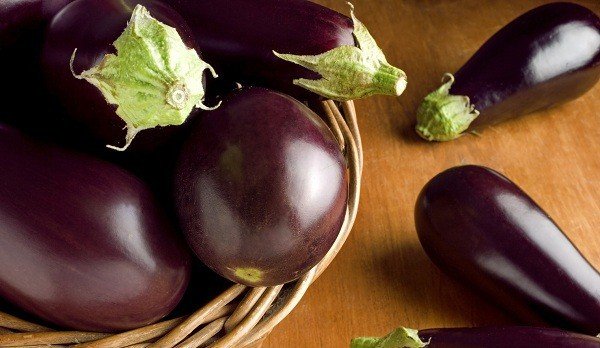Eggplant

Eggplant is a perennial herbaceous plant. It is also known as blue tomato. The homeland of this vegetable is the tropical regions of India, where it grows naturally in nature without the need to be planted.
As an annual crop in Europe, blue tomatoes have been cultivated since the 13th-15th centuries.
The natural color of eggplant is purple. However, today there are many varieties with different colors and shades, ranging from white to almost black, yellow and brown.
And you can also find blue tomatoes of various shapes and sizes. And the weight of the vegetable varies from 30 grams to 2 kilograms.
Only the pulp /inner part/ is more or less similar in all varieties of eggplant – dense, with small seeds and a specific taste. Raw blue tomato is not used as food.
Calorie
Raw eggplant contains 24 kilocalories, that is, it is a low-fat diet food. And the caloric value of the boiled blue tomato without salt is 33 kilocalories, and the stewed one – 189, which is why if it is consumed in this form, it may become a cause of obesity.
Nutritional value in 100 grams:
• Proteins – 1.2 grams;
• Fats – 0.1 grams;
• Carbohydrates – 4.5 grams;
• Water – 91 grams;
• Calorie content – 24 kilocalories;
Eggplant – beneficial properties
This vegetable contains:
• Solids, sugars, proteins, fats;
• Potassium, calcium, magnesium, sodium, phosphorus, sulfur;
• Bromine, chlorine, aluminum, iron, iodine, mobile;
• Fluorine, cobalt, copper, zinc
• Balanced complex of trace elements and vitamins – B1, B2, B6, B9, C, PP, P and D;
Most nutritionists are of the opinion that blue tomatoes are rich in so-called ballast substances /cellulose, pectin, etc./, which are not digested and practically not absorbed, but contribute to the removal of excess cholesterol from the body.
At the same time, the effect achieved in this way is significantly better than by taking special medications.
And it follows that dishes that also include eggplants prevent atherosclerosis, ischemic heart disease, gallstone disease and other diseases.
The mineral copper, which is in a significant amount in this vegetable, supports the blood-forming process, therefore it is recommended for anemia and for pregnant women. Eggplants also have bactericidal properties.
Blue tomatoes also have healing properties – they stimulate hematopoiesis in anemia, lower cholesterol levels in the blood and thus counteract the development of atherosclerosis.
Eggplant consumption is recommended for diabetes and kidney disease.
The vegetable is useful for elderly people suffering from cardiovascular diseases, especially if they retain water as a result of weakened heart function, that is, chronic congestive heart failure.
The presence of a large amount of potassium in the eggplant helps to strengthen the heart muscle and promotes the release of various fluids from the body.
It is also useful to eat eggplants in gout, as they increase the urinary excretion of uric acid salts.
Since blue tomatoes are a valuable source of many organic acids, they can be successfully used as a healing food for atherosclerosis.
In addition, they have diuretic properties and contribute to the normalization of intestinal function. The soft and tender inner part of the eggplant regulates the acid-alkaline balance.
In which the amount of cholesterol in the blood is greatly reduced – in individual cases up to over 40%.
The specific slightly bitter taste of eggplants is given to them by a substance called “solanine M”.
At higher concentrations it is poisonous, so this is not a concern, since in these vegetables, it is in a very small amount.



